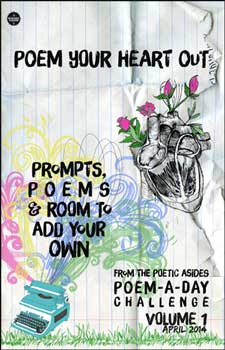April is National Poetry Month! Please welcome guest poet Bartholomew Barker with some tips on participating in Writer’s Digest’s Poem-a-Day Challenge.
I agree with T. S. Eliot: “April is the cruelest month.”
April is National Poetry Month. For the past seven years, Writer’s Digest editor Robert Lee Brewer has presented the April Poem-A-Day Challenge on the Poetic Asides blog. Brewer posts a prompt each morning and poets around the United States write a new poem that very day. This means thirty new poems per writer by the time May flowers.
It’s a brutal challenge, but satisfying for those who finish. This is my third year taking the challenge.
Brewer requests participants submit their top five poems written in April. He creates a best-of list and names a Poet Laureate. This year, in conjunction with Words Dance Publishing, he will produce an anthology of the winning poems. How does he plan to inspire writers?
“I love to write and use both ideas and images to get started. For my prompts, I try to make them specific enough that most poets have a firm springboard into their own poems, but I also like them to be open to a variety of interpretations,” Brewer explained. “For instance, a weather poem could mean a weatherman to one person, a tornado to someone else, and forgetting to bring an umbrella to yet a third person.” He wants to offer a “focused freedom” every day of the challenge.
Thousands of writers attempt the challenge. They may keep a strong pace for the first few days, but many tire of the daily requirement. Life’s obligations take over and stanzas don’t write themselves.
I offer a few tips to help writers keep their pens going. For two of the past three years Brewer has honored my poems. How did I make it through the daily challenge, push through the mental fatigue, and make time to write an original poem every day? Here’s how:
- Use the whole day. Writing a poem each day for thirty consecutive days is a test of endurance. The peculiar mental fatigue turns some writers off. My routine involves reading the prompt first thing in the morning, then I let it irritate my mind while I’m at my day job. In the evening I force something out and hope it’s a pearl.
- Just write. What if you miss a day? Doesn’t matter. Some days we’re busy. Move on. Take the next prompt and ignore the previous one, or write a poem a day late or a week later. Whatever. Just write. Use your own prompts if necessary.
- Let it go. I don’t expect to produce thirty masterpieces in April. If I get five decent poems, it’s a good month. I hope to get ten more that, with a lot of revision, could be crafted into something (that’s what May is for). Just get the poem out before falling asleep. For instance, here was the prompt for April 27th, 2011:
Take the phrase “In the (blank) of (blank),” replace the blanks with a word or phrase, make the new phrase the title of your poem, and then, write your poem. Some possible titles might include: “In the Heat of the Night,” “In the Heat of the Moment,” “In the Middle of a Heated Argument,” etc.
My poem:
In the last week of the month
In the last hour of the day
Desperate to keep
The streak alive
He types his internal monologue
Inserting line breaks
Removing superfluous words
Hoping for a coda
To appear…I got nothin’
Dammit
After 26 poems in 26 days, my exhaustion shines through. The key is to let it go and not worry about quality.
It helps to consider something like Poetry on Demand which is a valuable exercise in public poetry. Living Poetry, the group I help organize in North Carolina, sets up a table at street festivals. We write poems in three minutes for passersby who offer us one dollar and one word as a prompt. There’s only so much poetic trickery one can include in three minutes, so we just write, read the poem aloud, give the customer their poem, and move on to the next. While I’m sure plenty of my poems ended up in trash bins, I was told some are posted on refrigerators. It’s a poet honor.
I suggest all poets attempt the Poem-A-Day challenge at least once in their lifetime. Consider it a pilgrimage. All that is required is to write. Just like life, rules can be followed or not. Poems can be shared or not. It doesn’t matter. Use the whole day. Let it go, and just write.
About the Author: Bartholomew Barker is a poet based in Hillsborough, North Carolina. His poetry made the Top 25 nationally in the 2013 Poem-a-Day Challenge. Wednesday Night Regular, his debut poetry book, was published in November 2013. Bart’s work has appeared in Dead Mule School of Southern Literature, Three Line Poetry, and the anthology Point Mass. He is one of the organizers of the Triangle’s largest group of poets, Living Poetry. His Twitter handle is @bartbarkerpoet.





Trackbacks/Pingbacks